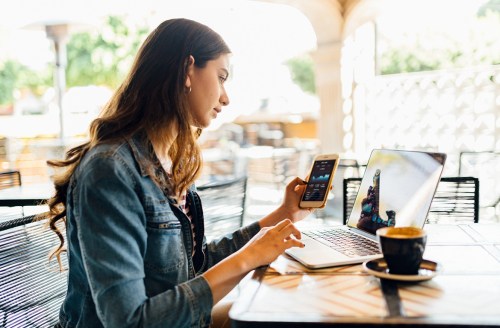How the Pandemic Made Me More Financially Responsible
Becoming more financially responsible during a pandemic isn't easy. Here's how one writer did just that, now being unemployed.

It’s hard to admit this, but I got used to living paycheck to paycheck. I leaned into the stereotypical “starving artist” narrative and often proclaimed, “I don’t need to make money to be successful, I just want to do what I love!” That was a defense mechanism. It was easier to pretend that I didn’t covet money rather than admit that my relationship with it was straight-up toxic.
Experts in This Article
finance expert and founder of the personal finance blog Econimikat
Shneidine Chery is the CEO of Millennial Money Management LLC.
I felt stupid because I didn’t understand the difference between a Roth IRA and a Traditional IRA. Intimidated by talk of REITs, ETFs, and mutual funds, I ignored investing altogether and only saved money for extravagant Caribbean vacations with a new wardrobe to boot. Money has never been a topic of conversation within my family, probably because most of my relatives struggle financially. Why would my financial trajectory be any different? For years, I believed that I couldn’t be financially abundant.
According to Katia Chesnok, Personal Finance Educator and Money Expert, “a scarcity mindset deeply affects our relationship with money, because it creates a barrier between us and our future achievements.” My scarcity mindset dictated every poor financial decision, including racking up credit card bills, ignoring student loan debt, and hardly saving a penny. When the pandemic hit, I only had $1,200 in my emergency fund, and that wouldn’t even cover my rent for a month if I lost my job. I am fortunate that I did not lose my job back in March, although I am now among countless Americans that are unemployed. It’s been a wakeup call. I knew I had to become more financially responsible in the midst of a pandemic. I had to find a way to bulk up my emergency fund and pay off my student loan debt despite uncertain economic times. Here’s how I did it.
I am now among countless Americans that are unemployed. It’s been a wakeup call. I knew I had to become more financially responsible in the midst of a pandemic.
I began by cutting my expenses in half, which wasn’t difficult. With everything closed, I wasn’t spending money on coconut margaritas or fancy dinners. As recommended by Chesnok, I am on a “Bare Bones Budget”, which hones in on what we need to survive. “Try to focus on your four basic walls: food and medicines, housing, transportation, and utilities,” Chesnok says. “The other categories of your budget, such as entertainment, clothing, makeup, gym, and cable can be added later on as they are often not necessary for basic survival.”
Due to this approach to budgeting, I am no longer living above my means, which once meant spending way too much on entertainment, travel, and shopping. Unemployment was imminent, so I took extreme measures this summer to save a three month emergency fund: a goal that I met this November. I eliminated my cable bill and when grocery shopping, I only purchase generic brands, as suggested by Financial Coach Shneidine Chery. I also said goodbye to junk food and my nail art obsession, only purchasing food and personal items that I need to survive.
Although my travel and entertainment funds were easy to save when a vacation wasn’t an option, it has been harder to break certain spending patterns, especially when bored at home perusing online sales. Chesnok emphasizes the importance of differentiating our wants from our needs. One way to do so is to pause before you buy. “Put your item in the cart and wait at least 48 hours before buying,” she suggests. This tactic curves my impulse purchases, as does focusing on my why. “Once we really find our why, then we will be much more disciplined, responsible, patient, and consistent,” she says.
For the past four years, my “why” has been my son, Evan. Now I understand that I also need to be a priority and that I deserve stability and financial success. When I work on my scarcity mindset, which I do by listening to affirmations while I sleep, journaling my fears, and acknowledging my wins, I feel like I deserve to have abundance. I repeat daily mantras, like the one stuck on my bathroom mirror on a pink post-it that reads, “I am a money magnet. Money flows to me. I am financially abundant.” And when I fear that I won’t have enough, I remind myself to stay in the present moment.
Focusing on the now, feeling grateful for my health during a terrifying pandemic, and remembering my why has created an internal shift. I feel calm about money for the first time in my life and, in turn, I don’t make desperate financial decisions. Instead, I’ve honed in on my skills as a digital content creator, branding expert, and website designer, and pitch my services to small businesses that are flailing offline. Since the summer, I’ve worked on various projects that helped increase my income. Today, I feel empowered and extremely proud of my financial progress. During a pandemic, I decided to become more financially responsible and to follow through on that promise despite challenging circumstances. I chipped away at my debt and saved more money than I ever expected I could. And for that, I am grateful.
Sign Up for Our Daily Newsletter
Get all the latest in wellness, trends, food, fitness, beauty, and more delivered right to your inbox.
Got it, you've been added to our email list.








